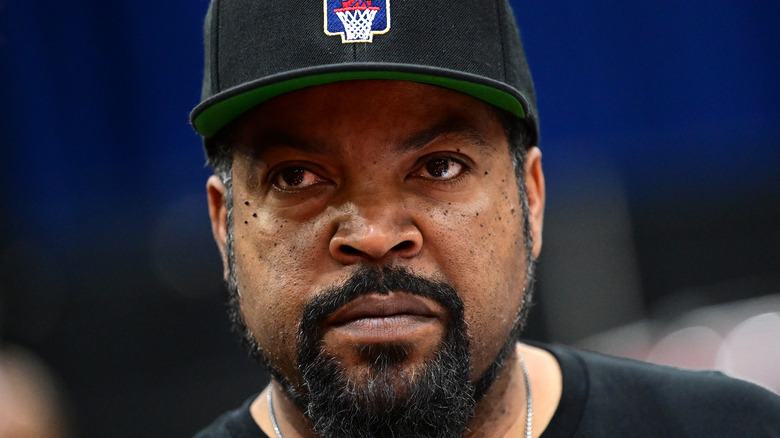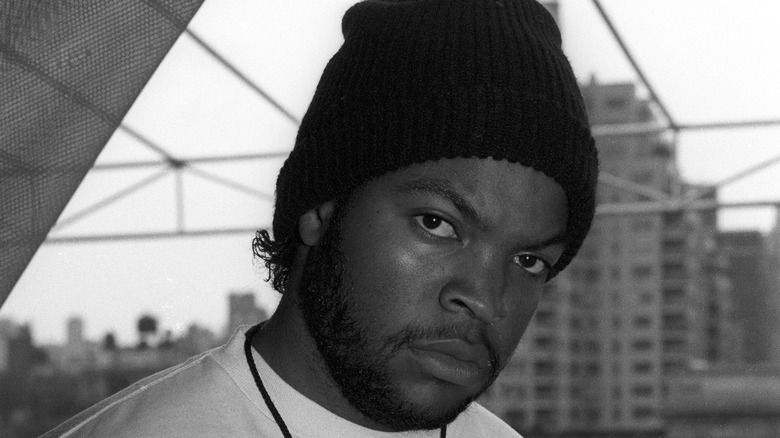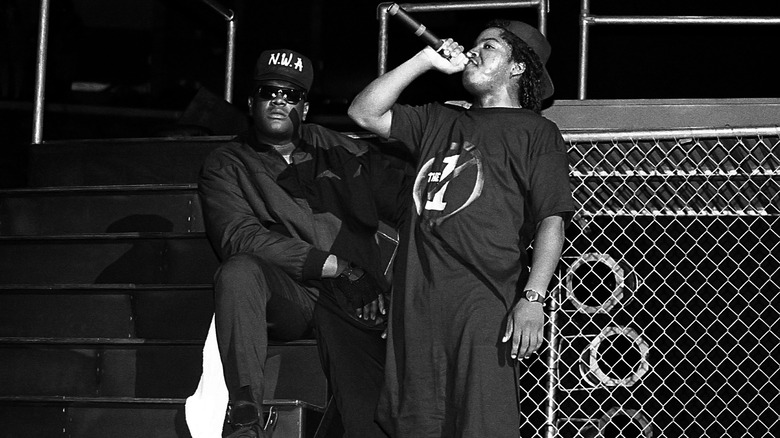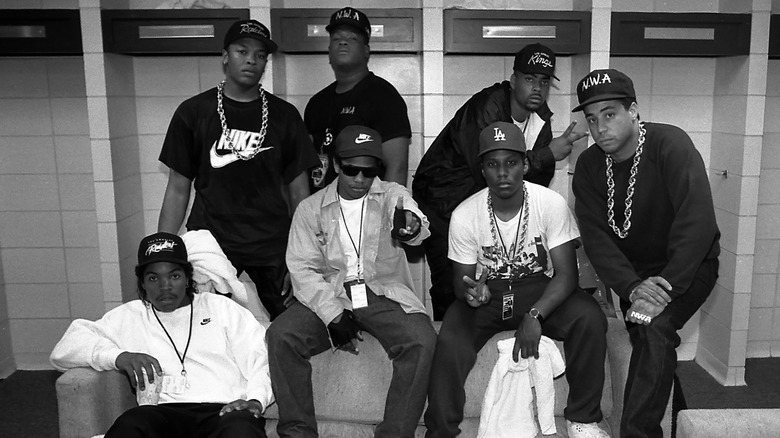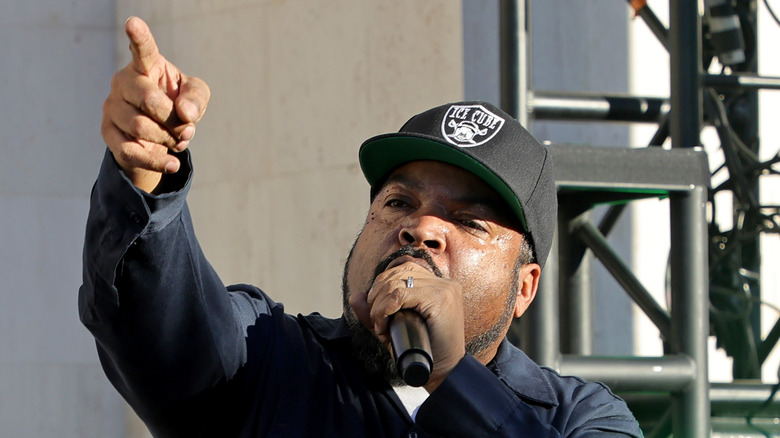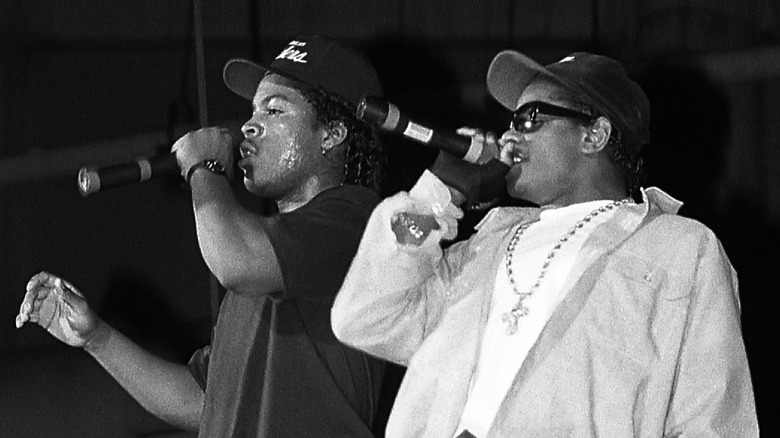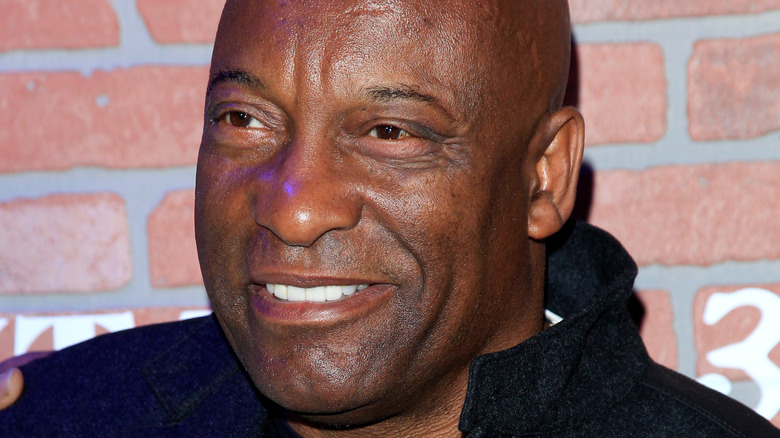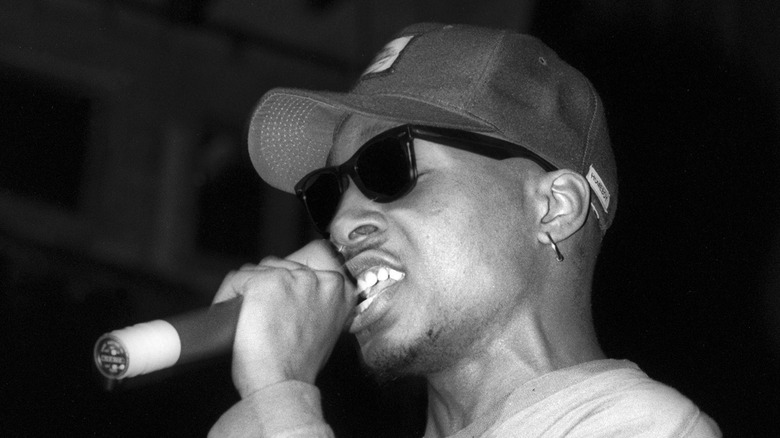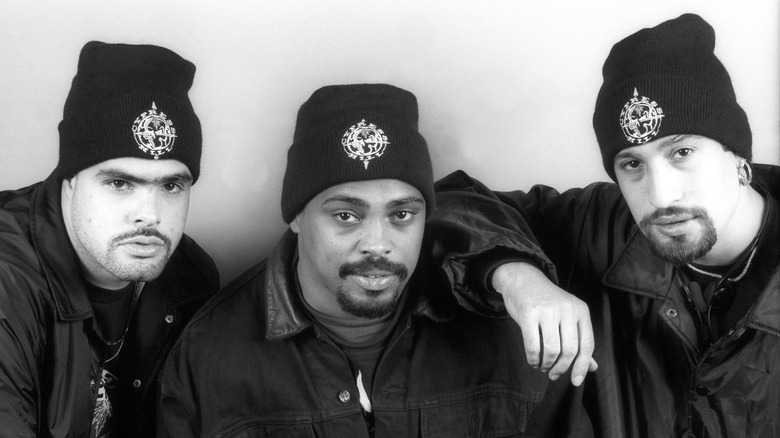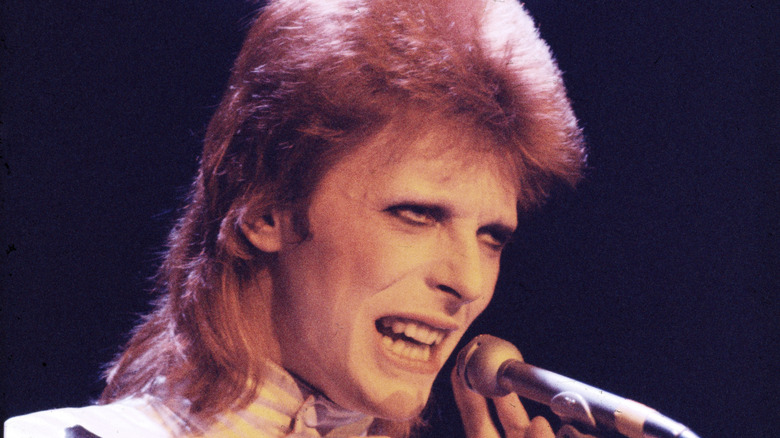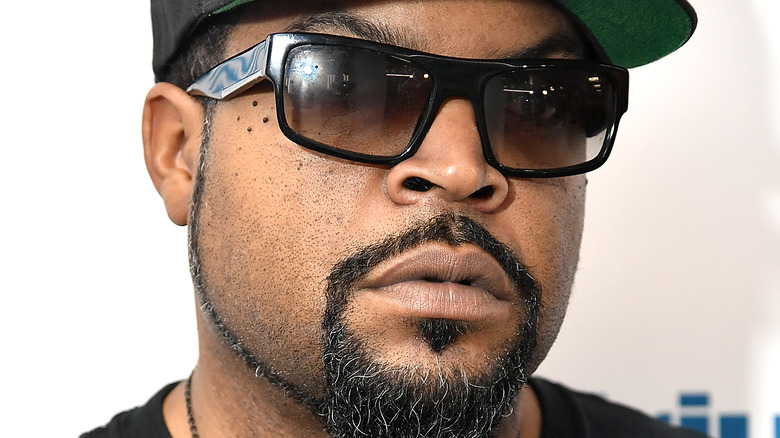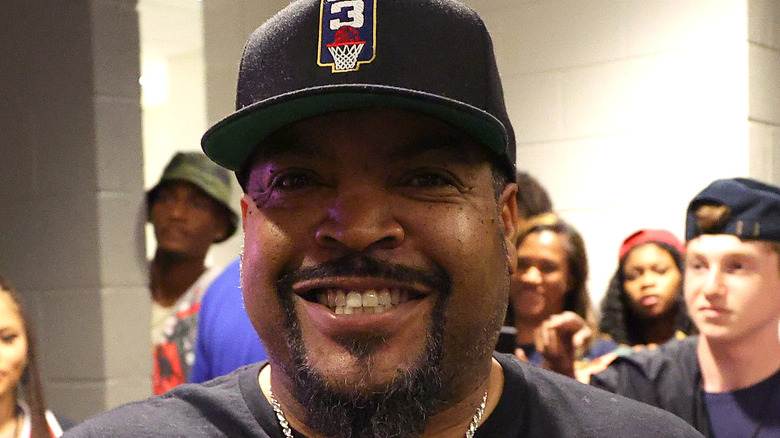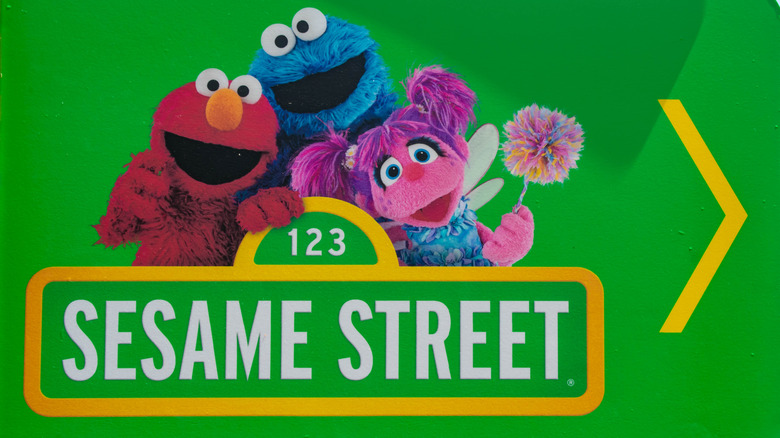The Untold Truth Of Ice Cube
Of all the rappers to blow up in the '80s and '90s, one of the most controversial, outspoken, and fiercely talented is O'Shea Jackson — but you know him as the crazy so-and-so named Ice Cube, from the gang called N.W.A. Cube grew up in a rough Los Angeles neighborhood, and his worldview was largely shaped by the stark differences he saw between "tha Hood," as he would come to call it, and the San Fernando Valley school to which his working-class parents had him bussed (via Biography).
Young Cube, still in the tray, decided early on that he was destined for a better life — and like many L.A. teens in the mid-'80s, he began to feel that rap music might be his ticket to that life. Unlike many of those teens, he was totally right — and for Cube, spitting dope verses led to a multi-decade career as a recording artist, actor, and entrepreneur.
Here's the untold truth of a man whose artistic output has run the gamut from violent and controversial to lighthearted and whimsical; a pretty darned good actor, and one of the most compelling rappers of all time — the one and only Ice Cube.
Ice Cube's early life was shaped by a family tragedy
According to author Ben Westhoff in his book, "Original Gangstas," the tiny mid-century house kept by Ice Cube's parents was as tidy as their neighborhood was rough — and aside from that hour-long bus ride to and from school every day, tween Cube enjoyed a pretty normal life, hanging out with friends and presumably getting into the everyday variety of tween trouble. That normalcy, though, was shattered in 1981, when Cube was only 12. As reported by HuffPost, it was then that the youngster's beloved half-sister, Beverly Jean Brown, was murdered by her husband.
It's not too tough to see the effects of the incident on Cube's lyrics, in particular his solo work; the far-reaching ripple effects of violence, and what he describes as America's "sick love affair" with guns, are recurring themes. Cube told HuffPost that he still thinks about Brown a lot; as noted by the outlet, in a 2011 VH1 "Behind the Music" on Cube, he said of her death, "That's when I knew that the world that I was living in was a dangerous place."
His rap handle has a hilarious origin story
Ice Cube's moniker has been with him for a long time, and it has served him well, even if he does (still, to this day) sometimes get confused with his friend and contemporary, Ice-T. While the name has become synonymous with complete badass, it didn't always register that way with rap fans in the early days, many of whom likely wondered just how he had come across it. As one might expect, it's a pretty entertaining story.
Cube explained the name's origins during on appearance on Stephen Colbert's The Late Show, and it came courtesy of a smart remark by his other sibling. "My brother gave me that name," Cube told Colbert, presumably declining to name him for privacy reasons. Cube went on to explain that his brother got tired of his younger sibling trying to talk to his girlfriends. "Back in the day, when you had an old refrigerator, they would push it on the curb, and guys would come by and pick it up. My brother was like, 'Yo, that refrigerator down the street? I'mma take you down there, slam you in the freezer, and when they pull you out you're gonna be an ice cube,'" he continued. Rather than taking offense, young Cube apparently realized the gift he'd been given. "That day," he told Colbert, "When I went outside, I told everybody, 'Man, don't call me O'Shea no more, my new name is Cube, call me Ice Cube.' And it just snowballed."
NWA was not his first group
According to Steven Otfinoski's book, "African-Americans in the Performing Arts," Ice Cube began rapping in high school, after being challenged by a kid in his typing class to see who could write a better rhyme. He soon put together a group with his friend Anthony Wheaton, who went by the handle Sir Jinx, and who (according "Original Ganstas," by Ben Westoff) was a budding producer who had put together a makeshift studio in his ramshackle garage. This group was first known as the Stereo Crew, but soon after they met a local up-and-coming DJ who went by the name of Dr. Dre, and, according to DubCNN, they decided a name change was in order.
Cube and Jinx's crew began going by the name C.I.A. at Dre's suggestion, which stood for ... well, a few different things, depending on who was asking, but mainly "Criminals in Action." Speaking with Yahoo! News, Cube recalled that the group's first and only single, the ridiculously titled "She's a Skag," seemed like it might offer up his breakout moment. "They played 'She's a Skag' on the radio. I almost lost my mind," Cube recalled. "I'm like, 'Turn it up!' I thought every car on the street was listening to it. It was one of those moments where I felt like, 'Damn, we got over the hump.'"
While Cube went on the explain that the song didn't really get much radio play, it was a seminal moment in his career.
He's the gangster... of architecture
Even during this sort of heady time, Ice Cube realized that he had to have a fallback plan in case the whole rapping thing didn't pan out. Fortunately, he had another interest that was quite unrelated to music: architecture. As he explained to Pacific Standard Time (via Dezeen) in 2011, "When N.W.A. was first about to pop off I wasn't sure if I was gonna make a living [from music]. Cussin' on the radio? I didn't know if that was gonna bring me any money, so I ended up going to school in Phoenix and spending a year out there."
In fact, according to Pacific Standard Time (via HipHopDX), Cube earned a certificate in architectural drafting. "I haven't picked up my certificate since I got it. If you want me to draw you up a house I can draw you up a house; I don't know if it's gonna be liveable," he deadpanned. And he retains an appreciation for the intricacies of architecture to this day. He holds a special affinity for the work of celebrated architects Ray and Charles Eames and found in them a sort of odd reflection of his eventual profession. "What I love about the Eames is how resourceful they are," he explained (via Dezeen). "[Their work takes] something that already exists and [makes] it something special, kind of like sampling."
He wrote a lot of Eazy-E's lyrics
As described in Steven Otfinoski's book, "African-Americans in the Performing Arts," Ice Cube and Dr. Dre soon found themselves gravitating toward a different project: as Vibe notes, a new group being bankrolled by local, street enterpreneur Eric "Eazy-E" Wright. By this time, Cube was finding his footing as a lyricist, and with fellow MCs Tracy "The D.O.C." Curry and Lorenzo "MC Ren" Patterson also on board, Dre was building himself a formidable stable. There was just one hitch: While the three MCs involved were still honing their presence on the mic, Dre was rightfully convinced that Wright, who was really only interested in being the money guy, was the one with the natural star power. Unfortunately, he exhibited no natural talent for rapping, as Curry pointed out in a VladTV interview.
Also in that interview, Curry remembered that once the decision was made to put Eazy-E front and center, he, Cube, and Patterson were enlisted to write the entirety of his smash hit solo debut album, "Eazy Duz It," splitting the load pretty much evenly. It was Cube, however, who was responsible for the two songs that began Eazy's ascension to stardom: "8-Ball," an Eazy solo credited to N.W.A. (which appeared on the compilation "N.W.A. and the Posse" and contains the lyrics "Ice Cube writes the rhymes that I say"), and "Boyz-n-Tha-Hood," a narrative masterpiece which inspired the 1991 film of the same name.
The role that launched his film career was written for him
"Boyz N the Hood" was the debut of legendary director John Singleton, which featured Ice Cube in his first acting role. According to Vice, Singleton went to work writing the film after pitching it in order to gain entry to film school at the University of Southern California and was working as an intern on a talk show when he realized that Cube, with whom he was casually acquainted, would be the perfect actor to portray Doughboy, who was based on a real-life friend of his.
"[Ice Cube] came on board because I wrote the part for him," Singleton remembered. "I knew him while I was in college and working on The Arsenio Hall Show, where I was a directing intern."
Singleton went on to explain how he convinced Cube to take the part. During one taping, Cube was trying to get backstage at the talk show, and he was stopped. Singleton vouched for the rapper and used that opportunity to make the pitch of his career. "I told him I had a script I'd been writing for him, and he gave me his phone number," he recalled. "He gave me a ride home one night when I was stranded in Hollywood ... And then I said: 'Remember that script I told you about? I wrote it.'"
It turned out to be a good partnership: Singleton became the youngest director and first African American to ever be nominated for an Oscar, and Cube parlayed the role into a prolific film career that continues to this day.
Ice Cube has a famous cousin
You may not have guessed it from their respective styles, but Ice Cube is the older cousin of another famous MC: Oakland legend Del the Funkee Homosapien, who has enjoyed a three-plus decade career of his own. In fact, when Del was a teenager — before the release of his 1991 debut "I Wish My Brother George Was Here" — according to All Hip Hop, Cube gave him a break by tapping him to pen the lyrics to "Gangsta's Fairytale," a track from Cube's solo debut "Amerikkka's Most Wanted."
Speaking with HipHopDX, Del clarified that Cube in no way actually needed the help. "If you can't come out at the moment, you can eat just by writing people's [rhymes]," he said. "Not everybody's got the skill that you might have, and you can get paid off of that. That's how I got paid. ... So to put some bread in my pocket, Cube enlisted me to write." Cube returned the favor by writing the tune "Dr. Bombay" on Del's debut, and he even appeared on the record on the track "Hoodz Come in Dozens."
His beefs are the stuff of Hip-Hop legend
N.W.A. famously conquered the rap world with their 1988 debut "Straight Outta Compton" (and drew the ire of the FBI with its merry tune "F*** Tha Police"), as per Britannica. But in the wake of its success, Ice Cube — who penned a disproportionate amount of the album's lyrics — left the group, being dissatisfied with his earnings, and with the group's manager, Jerry Heller. The dispute was settled out of court, but that wasn't quite enough for Cube; on his subsequent solo releases, he took several shots at N.W.A. and Heller, in particular on the track "No Vaseline," one of the most blistering diss tracks of all time, as per the New York Post.
Cube has also lyrically called out Chicago MC Common, whose classic "I Used to Love H.E.R." he had misinterpreted as a swipe at West Coast rappers; that misunderstanding was later resolved, and the pair even later released a track together (via Cuepoint). It took a bit longer for the rift between Cube and L.A. crew Cypress Hill to blow over, however. In a VladTV interview, Cypress rapper B-Real recalled how the band had contributed a song to the soundtrack for Cube's comedy masterpiece "Friday," but not the one Cube had wanted — the eventual Cypress single "Throw Your Set in the Air." Disappointed, Cube simply wrote another song with suspiciously similar lyrics for the soundtrack, resulting in lyrical barbs being lobbed by both parties in a beef that wouldn't be squashed for years.
He's collaborated with rock artists
Ice Cube has always been a collaborative type, having appeared on songs by many of raps big names, including his old buddy and perhaps doppelgänger Ice-T, as per Hip Hop News Journal. Unusually for such a hardcore type, though, he has performed on a handful of collabs with artists that appear to be far outside his wheelhouse, not to mention his muscial genre. In 1997, he contributed vocals to one of many versions of David Bowie's "I'm Afraid of Americans," which happened to be remixed by Nine Inch Nails' Trent Reznor. In a Rolling Stone interview shortly sfter Bowie's passing, Cube said, "He was such an innovator, and his songs were phenomenal ... I remember when I first heard 'Fame' on the radio, I thought he was black. It was so funky!"
Cube also developed a kinship with metal band Korn, appearing on their tune "Children of the Korn" from their 1998 debut album "Follow the Leader." The band's lead singer Jonathan Davis explained in an interview with Audacy, "That for me was one of the shining highlights of my whole career ... He came into the studio and he was like, 'I got this idea, about the Children of the Korn.' He just broke it all down, we're all, 'Okay, Mr. Ice Cube.'" Korn returned the favor by touring with Cube for 1998's Family Values tour and appearing on his 1999 release "War and Peace Vol. 1" (via MTV).
He has a troubling history of anti-Semitic lyrics and remarks
Of course, as with many rappers of his era, a few of Ice Cube's lyrics were questionable. In his N.W.A. days, many of them were openly violent and misogynistic (not exactly surprising), but as a solo artist, The Daily Beast reports he became prone to dropping rhymes that many interpreted as being racist (on tracks like "Black Korea") and/or anti-Semitic, and when it comes to that last thing, he hasn't really done much to dispel the perception.
The Daily Beast ran down a sizable list of these offenses, noting that even on the classic N.W.A.-killer "No Vaseline," his barbs directed at Jerry Heller, who is Jewish, carried some pretty icky connotations. Cube tended to hand-wave such lyrics in later years, noting that hey, he was simply accurately describing Heller as, well, a white Jew; the Beast cited an interview in which he said, "I'm not against Jews ... I'm just doing what they do in the media," arguing that the news often describes people by their ethnicity, color of their skin, or even religious background. Even quite recently, though, Cube has been known to post extremely problematic memes having to do with Jews on social media, as the Daily Beast notes, which doesn't really seem like fence-mending behavior.
He walked away from a huge payday for a pretty lame reason
In 2021, Ice Cube was set to keep his acting career rolling during the pandemic era with a co-starring role in Sony Pictures' comedy "Oh Hell No" opposite Jack Black. Now, tell us: How much would you pay to see Ice Cube and Jack Black starring in a buddy comedy? A lot, but unfortunately, Cube exited the picture for a questionable reason: The production required its stars to receive a Covid-19 vaccine, and Cube declined, according to The Hollywood Reporter.
Strangely, the outlet notes that throughout the pandemic, Cube had been a strong proponent of masking — but apparently, being asked to get a shot in the arm offering safe, effective protection against the deadly virus was a bridge too far. Cube has not publicly commented on the situation, apparently preferring to put his (loss of) money where his mouth is: He was set to earn a whopping $9 million for the role. Hey, maybe he's just really, super-afraid of needles.
He became so family-friendly he even appeared on Sesame Street
You're probably aware that, despite his hardcore beginnings, Ice Cube's film output has run the gamut from 'hood movies (like "Trespass," with Ice-T, of all people) and actioners (like "XXX: State of the Union" and "Anaconda") to extremely family-friendly fare. His movies have combined for over $1 billion at the worldwide box office (via The Numbers) and among his highest-grossing flicks are such kind, gentle offerings as 2002's "Barbershop," 2005's "Are We There Yet?" and its 2007 sequel, and 2014's "The Book of Life."
Prepare yourself, though, for Cube's single most "Awwww!" moment of all time: A 2014 appearance on Sesame Street (yes, really), wherein he teaches that sweet, innocent monster Elmo the meaning of the word "astounding."
